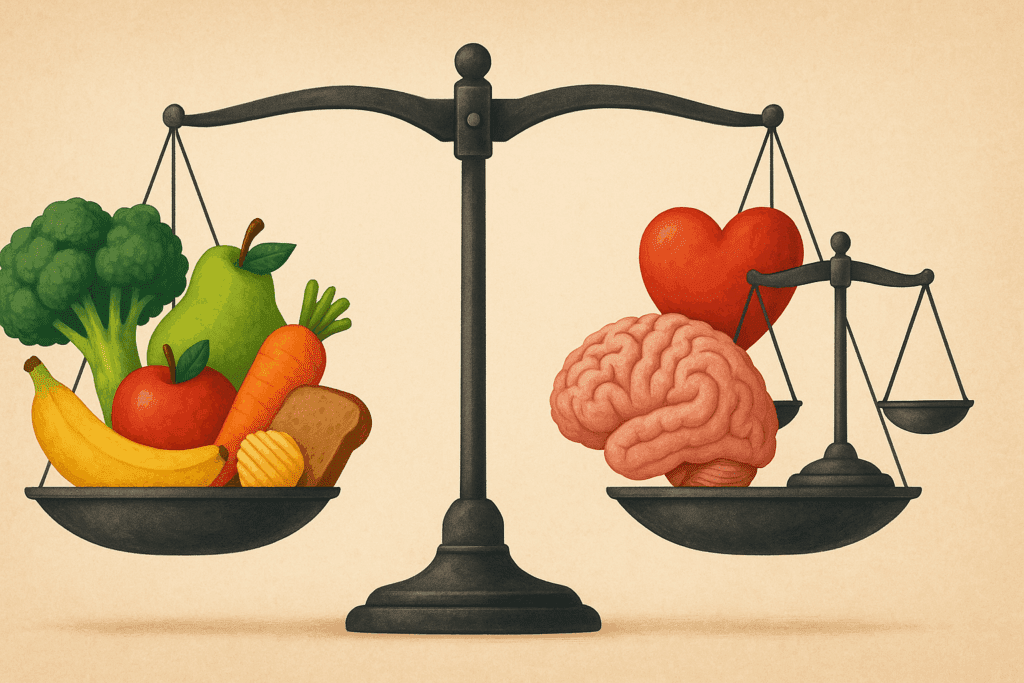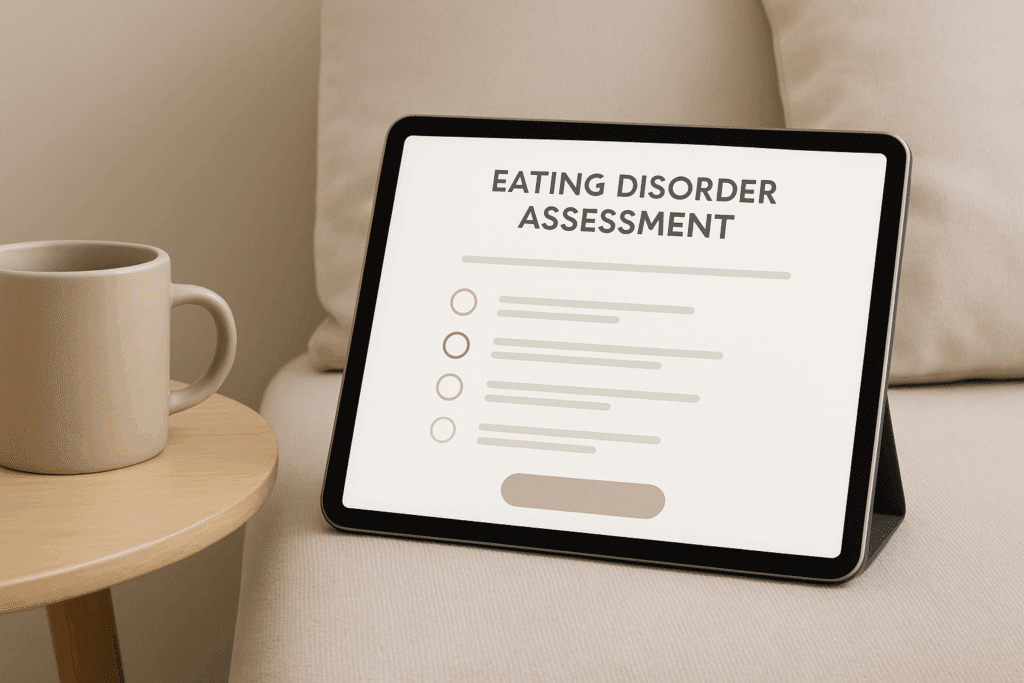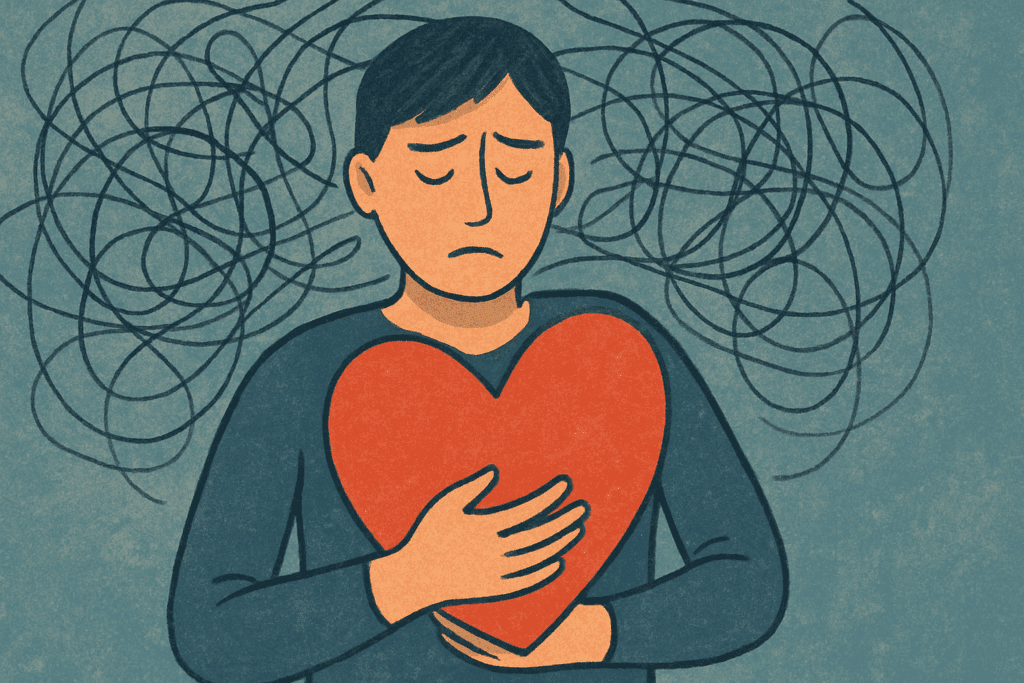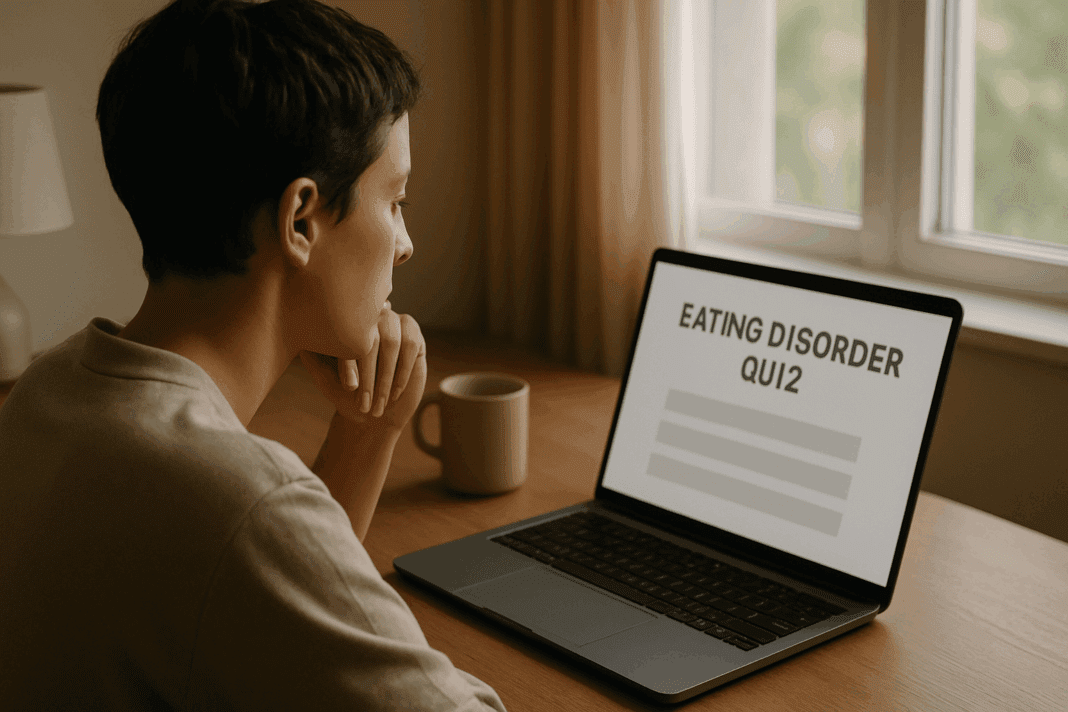Understanding Eating Disorders Through a Mindful and Informed Lens
Recognizing the early signs of an eating disorder can be one of the most difficult yet critical steps toward healing. For many, the journey begins with a quiet question: Do I have an eating disorder? This question, often sparked by concern about one’s eating habits, body image, or emotional well-being, is far more than a moment of self-reflection—it’s an opportunity for self-awareness and positive change. In an era where discussions around mental health and nutrition are increasingly mainstream, tools like a trusted eating disorder quiz or an eating disorder assessment test can provide essential insight. While these tools are not diagnostic instruments, they offer a preliminary lens through which individuals can explore whether their relationship with food and body image warrants deeper attention.
You may also like: How to Stop Emotional Eating and Regain Control: Mindful Nutrition Strategies That Support a Healthier Lifestyle
Eating disorders are complex mental health conditions that manifest in both physical and psychological forms. They extend beyond stereotypes of extreme thinness or food avoidance and encompass a spectrum of behaviors, including bingeing, purging, restrictive eating, and compulsive exercise. Utilizing a clinically informed eating disorder test can empower individuals to evaluate patterns in a structured and confidential way. By combining holistic awareness with medically grounded screening tools, individuals can take the first step toward understanding what they may be experiencing—and most importantly, toward seeking help.

What Are Eating Disorders and Why Do They Matter?
Eating disorders are not lifestyle choices or mere attempts at weight control. They are serious mental health conditions with biological, psychological, and sociocultural roots. When left unaddressed, they can lead to long-term physical health complications, including heart conditions, bone density loss, gastrointestinal distress, and even organ failure. Beyond the physical toll, the emotional and cognitive strain of living with an eating disorder often includes intense anxiety, shame, perfectionism, and low self-worth. Individuals may feel trapped by compulsions they don’t fully understand and isolated by a culture that both stigmatizes and glamorizes disordered behaviors.
The most common types include anorexia nervosa, bulimia nervosa, binge eating disorder, and other specified feeding or eating disorders (OSFED). Each disorder manifests differently, and not every individual will present with the stereotypical signs. For instance, someone may not be underweight and yet suffer from anorexia nervosa due to intense food restriction and fear of weight gain. Others may struggle silently with binge episodes followed by guilt and purging behaviors. This is why accessible tools, such as a medically reviewed eating disorder screening tool or an anorexia assessment test, are vital in bridging the gap between suspicion and diagnosis.
In a society increasingly aware of mental health, there’s a growing need to understand eating disorders with the nuance they deserve. This understanding begins with dismantling myths and replacing them with evidence-based insights. For example, the belief that eating disorders only affect young women is outdated; individuals of all genders, ages, races, and body sizes can and do experience them. Early identification through a reliable eating disorder indicator test can change the trajectory of someone’s health journey, potentially preventing years of suffering.

When Curiosity Becomes Concern: Signs You May Need an Eating Disorder Assessment
Curiosity about one’s eating behaviors can often emerge from a moment of self-awareness—a skipped meal, a sudden obsession with calories, or guilt following a meal. When such behaviors become frequent or emotionally charged, it may be time to seek clarity. A well-designed eating disorder assessment test or ED quiz can provide a structured reflection, helping to identify patterns that might otherwise go unnoticed. These assessments typically ask about behaviors such as food restriction, binging, purging, compulsive exercise, body dissatisfaction, and anxiety around food or weight.
One of the strengths of an eating disorder quiz is that it normalizes asking questions about mental and physical well-being. For instance, someone might not feel comfortable saying “am I anorexic?” aloud, but they may be more open to taking a discreet quiz that asks, “Do you avoid eating even when you’re hungry?” or “Do you feel out of control when eating?” These questions can help highlight areas of concern that might be linked to various types of eating disorders.
If you’ve ever wondered, “Do I have anorexia?” or “What eating disorder do I have?” it’s important to understand that there is no single behavior or thought that defines an eating disorder. Rather, it is the frequency, intensity, and emotional distress linked to eating behaviors that indicate a potential concern. Using an anorexia eating disorder test or an eating disorder assessment can provide validation and direction. Importantly, these tools are not about self-diagnosis but rather self-awareness—a critical first step toward healing.

How Eating Disorder Quizzes and Screening Tools Work
A trustworthy eating disorder screening tool is designed with evidence-based criteria derived from the Diagnostic and Statistical Manual of Mental Disorders (DSM-5), clinical practice guidelines, and validated psychological scales. When used ethically and responsibly, these tools can offer a preliminary understanding of symptoms and suggest whether a comprehensive evaluation from a healthcare provider is warranted. Often, these quizzes ask about frequency of behaviors (such as binge eating or purging), emotional patterns (like shame or fear around food), and body image concerns. They may also explore compensatory behaviors, including excessive exercise or fasting.
The question “Do I have anorexia nervosa?” may seem simple, but the answer requires exploration of many nuanced factors. Tools such as the anorexia assessment test or an eating disorder assessment test help break down these factors into measurable behaviors and attitudes. A quiz might ask: “Do you weigh yourself multiple times a day?” or “Have you recently lost a significant amount of weight without medical cause?” These aren’t definitive indicators, but they are significant red flags that signal the need for professional guidance.
In a culture where body dissatisfaction is normalized, a person may not recognize when their behaviors cross into disordered territory. That’s where the value of a carefully crafted ED quiz becomes clear. These tools are not diagnostic replacements for medical evaluation, but they play an important role in early intervention. For many people, completing a quiz is the first time they’ve fully reflected on their behaviors without minimizing or rationalizing them. It is a brave act of self-inquiry that often paves the way for further action.

The Psychological Dimensions of Eating Disorders: More Than Food
At the heart of most eating disorders lies a complicated interplay of psychological, emotional, and cognitive factors. While the symptoms often revolve around food and weight, the roots of these disorders typically run much deeper. Issues such as trauma, low self-esteem, anxiety, perfectionism, and difficulty regulating emotions can all contribute to the development and persistence of disordered eating behaviors. An eating disorder test does more than just assess food-related behaviors—it also highlights the emotional distress that accompanies these patterns.
Taking a quiz like “Do I have an ED?” isn’t just about checking boxes for certain behaviors. It’s about exploring one’s emotional relationship with food, the body, and control. For example, individuals with anorexia may use food restriction as a way to manage feelings of inadequacy or chaos in other areas of their lives. In contrast, those with binge eating disorder may use food as a way to self-soothe or numb difficult emotions. A well-designed eating disorder assessment tool acknowledges these emotional layers by asking reflective questions such as, “Do you feel out of control when eating?” or “Do you eat in secret due to shame?”
By understanding the psychological roots of eating disorders, individuals can begin to shift from self-judgment to self-compassion. Taking an eating disorder assessment test may illuminate the underlying pain driving the behaviors. This self-awareness is not only empowering—it is often the first step toward transformation. A reliable eating disorder indicator test can serve as a mirror, helping individuals recognize the mental patterns that sustain their distress and prompting them to reach out for support.

Taking the First Step: How to Approach an Eating Disorder Quiz With Care
Approaching an eating disorder quiz requires a mindset of openness and curiosity. It’s important to remember that the purpose of the quiz is not to label or judge but to inform and support. If you’re wondering, “Do I have anorexia?” or “Am I anorexic?” the quiz offers a low-pressure way to explore these thoughts without stigma. This is especially valuable for those who may not be ready to speak openly with a doctor or therapist. In this way, an anorexia eating disorder test can serve as a stepping stone toward more formal care.
Completing a quiz can also serve as a reality check, particularly for individuals who have normalized harmful behaviors. For example, someone who skips meals regularly and exercises obsessively might not consider these behaviors problematic until prompted by a screening tool. The structure of an ED quiz allows users to reflect systematically on their experiences, often leading to a new awareness of their physical and mental health. While self-assessments are not definitive, they are validating—they say, “Your concerns are real and worth exploring.”
After taking an eating disorder assessment, the next step is crucial: seeking professional guidance. A licensed therapist, dietitian, or physician can offer a comprehensive evaluation and treatment recommendations. The quiz can be brought to a medical appointment to spark discussion, clarify symptoms, and inform the direction of care. In this way, the quiz becomes more than just a personal reflection—it becomes a collaborative tool in a larger journey toward recovery.

Why Early Identification Matters: Prevention, Support, and Hope
Eating disorders often develop gradually, with subtle signs that escalate over time. Early identification through tools such as the eating disorder assessment test or the “do I have anorexia nervosa quiz” can prevent years of physical and emotional damage. The earlier treatment begins, the better the outcomes. This is especially true for adolescents and young adults, but it holds for individuals of any age. Timely intervention can halt the progression of disordered behaviors, address the root causes, and restore physical and mental well-being.
Moreover, early detection fosters a proactive mindset. When individuals use an eating disorder quiz to assess their symptoms, they are actively participating in their own health journey. This self-directed approach encourages empowerment rather than shame. It shifts the narrative from one of secrecy and fear to one of awareness and healing. Whether someone is using a types of eating disorders test to better understand their symptoms or an anorexia assessment test to evaluate their weight-related behaviors, the information gained can be life-changing.
Prevention also plays a key role. When warning signs are recognized early, families, schools, and communities can respond with education and support. Conversations about body image, media influence, nutrition, and emotional regulation can be introduced before disordered eating takes root. Trusted screening tools, especially those grounded in clinical best practices, are vital components of public health efforts to reduce the prevalence and impact of eating disorders.

Moving Toward Healing: What Comes After the Quiz
Taking an eating disorder quiz is a brave and commendable first step, but it should not be the last. The insights gained from tools like the eating disorder indicator test or the “do I have an eating disorder quiz” are meant to guide—not replace—professional care. If your results suggest a possible concern, reaching out to a mental health professional is the next vital move. Many clinicians specialize in eating disorder treatment and can provide tailored support that addresses both symptoms and underlying issues.
Therapy options may include cognitive-behavioral therapy (CBT), dialectical behavior therapy (DBT), family-based therapy (FBT), and nutrition counseling. Treatment plans often involve a multidisciplinary team, including therapists, dietitians, and medical doctors. Recovery is not linear, but it is entirely possible with the right support. The journey begins with understanding—and that understanding often starts with something as simple and accessible as a quiz.
Additionally, community support plays a significant role. Peer groups, support forums, and nonprofit organizations dedicated to eating disorder awareness can provide validation and connection. Many individuals feel isolated in their struggles, believing they are alone in their experiences. Sharing stories, seeking information, and taking steps like using an eating disorder assessment test can help break that isolation and promote a sense of belonging and hope.
Frequently Asked Questions About Eating Disorder Quizzes and Assessments
What makes a digital eating disorder test reliable, and how do I know I can trust the results?
A reliable eating disorder test is typically grounded in validated psychological frameworks such as the DSM-5 diagnostic criteria and developed in collaboration with clinicians specializing in eating disorders. Trustworthy tools often undergo peer review or are hosted by reputable health organizations and academic institutions. When engaging with an eating disorder assessment test online, look for transparency about the source, the methodology used, and disclaimers that clarify it is not a diagnostic tool but rather a screening instrument. While a high-quality eating disorder quiz can highlight potential concerns, only a licensed mental health professional can confirm a diagnosis. Always use such tools as a preliminary step—if the quiz suggests potential issues, it’s essential to seek clinical evaluation.
How is an ED quiz different from other mental health screeners like anxiety or depression assessments?
Unlike general mental health assessments, an ED quiz specifically targets thoughts, behaviors, and emotional patterns around food, body image, and self-control. The questions are tailored to reflect the unique manifestations of eating disorders, including compulsive exercise, restrictive intake, binging, and purging behaviors. A well-crafted eating disorder assessment, such as an anorexia test or eating disorder indicator test, captures nuances in how people relate to nourishment and weight that wouldn’t typically appear on a depression screener. These quizzes explore psychological distortions around body perception that are often central to disorders like anorexia or bulimia. While co-occurring conditions are common, the specificity of an eating disorder screening tool ensures a more focused exploration of food-related concerns.
If I score high on a ‘Do I Have Anorexia Quiz,’ does that mean I definitely have the disorder?
Not necessarily. A high score on a do I have anorexia quiz or anorexia assessment test indicates that you may be experiencing patterns or behaviors commonly associated with the disorder. However, these quizzes are not designed to provide a diagnosis, and many factors—including medical, psychological, and social history—must be considered for a clinical determination. It’s also worth noting that some individuals may exhibit disordered eating without meeting full diagnostic criteria for anorexia nervosa. A quiz result should be viewed as an invitation for further reflection and, ideally, professional consultation. The anorexia eating disorder test is a helpful tool, but it is the beginning—not the conclusion—of the diagnostic journey.
Can someone use an eating disorder assessment test preventively, even without clear symptoms?
Absolutely. An eating disorder assessment test can be a valuable resource for individuals exploring their relationship with food, especially during periods of stress, transition, or emotional upheaval. Preventive use of tools like an eating disorder quiz or ED quiz can foster early self-awareness, helping individuals recognize subtle patterns before they become entrenched. For example, consistent preoccupation with calorie tracking or guilt after meals may not initially seem serious but could evolve into more problematic behaviors over time. Taking a types of eating disorders test proactively can provide insight and initiate meaningful conversations with trusted healthcare providers before symptoms escalate.
How do eating disorder quizzes accommodate diverse identities and experiences, such as gender or cultural background?
Historically, eating disorder screening tools were skewed toward Western, female, and thin-centric ideals, but many newer assessments aim to be more inclusive. A modern eating disorder quiz will account for the fact that people of all genders, body sizes, and ethnic backgrounds can struggle with disordered eating. Some quizzes now include neutral or culturally adapted language, and emerging research supports developing targeted versions of the do I have an eating disorder quiz for underrepresented populations. Inclusivity in eating disorder assessments ensures that symptoms in marginalized groups are not overlooked or misinterpreted. When choosing a quiz, seek one developed with cultural sensitivity and representation in mind.
Is there a difference between an eating disorder quiz and an eating disorder screening tool used by professionals?
Yes, there are important distinctions. While an eating disorder quiz found online is often self-directed, brief, and designed for personal reflection, a formal eating disorder screening tool used by clinicians is more comprehensive and validated through research. Professional tools are typically administered during intake evaluations or health assessments in clinical settings and may include in-depth interviews or psychological testing. These tools not only identify risk but help guide treatment planning. Nonetheless, quizzes like the do I have anorexia nervosa quiz or the what eating disorder do I have self-assessment can still be meaningful entry points into clinical care, especially for those hesitant to initiate formal treatment.
What should I do after taking a ‘Do I Have an Eating Disorder Quiz’ if I’m unsure about the results?
If the results are unclear or if you’re conflicted about what they mean, the best course of action is to bring your quiz results to a licensed professional—preferably a therapist or dietitian who specializes in eating disorders. These providers can help interpret your responses in the context of a broader psychological and medical assessment. Don’t disregard ambiguous results; even subtle or subclinical symptoms can impact health and well-being. If you’ve taken multiple quizzes, such as an anorexia test, ED quiz, and a general eating disorder assessment, and they each point to different things, a clinician can help you piece together the full picture. Remember, you don’t need to “qualify” for a diagnosis to deserve support.
How do I know which type of eating disorder assessment is most appropriate for me?
It often depends on your symptoms and concerns. If your primary struggle involves intense food restriction and fear of gaining weight, a focused tool like an anorexia assessment test might be most illuminating. If you experience a combination of behaviors, such as periods of binge eating followed by compensation or food rituals, a broader eating disorder assessment or types of eating disorders test could provide better insight. Many people take more than one quiz—such as the do I have anorexia quiz and the how to tell if you have an eating disorder test—to explore overlapping symptoms. Comparing the outcomes can highlight patterns and help guide the next steps. When in doubt, begin with a general eating disorder indicator test and seek professional guidance to refine your understanding.
What are the risks of misinterpreting the results of an online eating disorder quiz?
Misinterpretation is a valid concern, especially when users lack clinical context. Some individuals may dismiss troubling signs because the quiz did not yield a dramatic result, while others may become unnecessarily anxious if they misread questions or over-identify with minor behaviors. A major risk is self-diagnosing and then delaying professional help, either out of fear or a false sense of reassurance. While an eating disorder test or ED quiz is a useful reflection tool, it should never replace clinical judgment. It’s also important to recognize that no quiz, including the anorexia eating disorder test or eating disorder screening tool, can account for every unique circumstance—context matters deeply.
Can these quizzes support recovery or relapse prevention for someone previously diagnosed with an eating disorder?
Yes, but with caution. For someone in recovery, revisiting a do I have an ED quiz or eating disorder assessment test can act as a form of self-monitoring. It may help detect early warning signs of relapse, such as renewed preoccupation with food or emerging body image distress. However, over-reliance on quizzes can backfire if used obsessively or as a form of reassurance-seeking, which can trigger anxiety or compulsive behavior. Tools like the anorexia test or eating disorder indicator test should be used periodically, and ideally, within the framework of a recovery plan guided by a mental health professional. When integrated into therapeutic routines, they can enhance self-awareness and help individuals stay aligned with their wellness goals.
Reflecting on the Power of Self-Awareness: Why Eating Disorder Quizzes Matter in the Path to Wellness
In the landscape of mental health and nutrition, self-awareness is one of the most powerful tools we possess. When individuals ask, “Do I have an ED?” or “How to tell if you have an eating disorder test,” they are engaging in a process of introspection that can lead to meaningful change. Quizzes and assessment tools are not about labels—they’re about understanding patterns, identifying concerns, and building a bridge to support. Whether it’s an anorexia test or a broader eating disorder screening tool, these resources offer clarity in moments of confusion.
The path to healing begins with a single step, often guided by courage and curiosity. Eating disorder quizzes serve as accessible entry points for those who may feel overwhelmed by the thought of therapy or diagnosis. They provide a space for honesty, reflection, and potential relief. In a culture that often equates health with appearance and worth with weight, choosing to explore one’s relationship with food is a radical act of self-care.
Ultimately, the goal is not to diagnose yourself through a quiz but to better understand your mind and body. By taking a trusted eating disorder quiz or anorexia assessment test, you are choosing awareness over avoidance and self-compassion over judgment. In doing so, you move one step closer to healing—and to reclaiming a life grounded in nourishment, balance, and emotional well-being.
Was this article helpful? Don’t let it stop with you. Share it right now with someone who needs to see it—whether it’s a friend, a colleague, or your whole network. And if staying ahead on this topic matters to you, subscribe to this publication for the most up-to-date information. You’ll get the latest insights delivered straight to you—no searching, no missing out.

